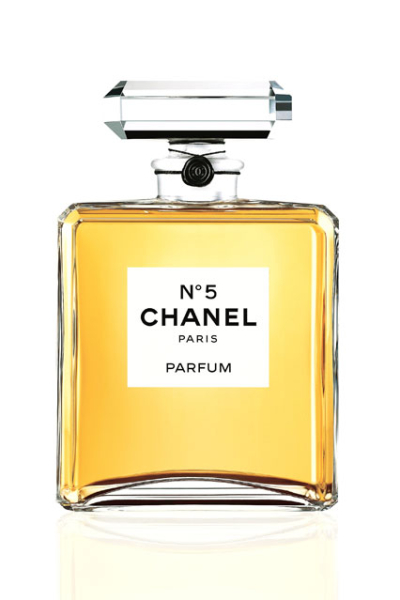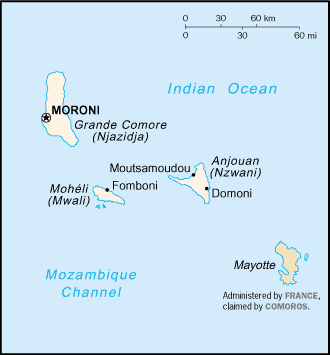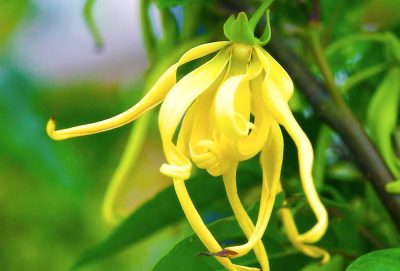www.hovedsteder.blogg.no is a Norway-based blog about the capitals of the world, with a focus on tourism, travel, transport, politics, diplomatic affairs, lifestyle, culture and entertainment, food and drink.
Se også vår reiseblogg / see also our travel blog at www.minbestereise.blogg.no – contact us a [email protected]
In a dense thicket in the middle of the impoverished Indian Ocean archipelago of the Comoros, Ibrahim Bacar is plucking tiny ylang ylang flowers.
The barely visible yellow blossoms with an intoxicating aroma contain the oil that provides the distinctive scent in Chanel N°5, one of the world’s best-selling fragrances, the AFP news agency writes.
Ylang ylang is also a key ingredient of many other perfumes and Comoros is the world’s top producer of the essential oil extracted from the flower – a commodity that makes up one-tenth of the archipelago’s total export revenues.
But decades of under-investment in ageing plantations, an exodus of flower gatherers willing to do the painstaking work and deforestation are threatening production of the flower.
“Despite the economic importance of the essential oil of ylang ylang, it is surprising that there is no improvement programme for the plant”, wrote Celine Benini, an agriculture specialist at Belgium’s Liege University, in a study.
Each year, Comoros produces between 30 and 40 tonnes of the essential oil mainly on the island of Anjouan, home to 350 distilleries.
“One container of 30 litres is worth several thousand euros, it is a gold bar,” said Gerard overseeing the Humblot plantation, named after the French naturalist Leon Humblot.
Ylang ylang originated in the Philippines and means “flower of flowers” in the local Tagalog language.
The French introduced the tree on the island of Reunion in the 1700s and in the early 1900s its cultivation spread to the nearby islands of Comoros and Madagascar.
In 1921, Coco Chanel wanted a flower that captured “the scent of a woman”.
The solution was the ylang ylang, which led to the creation of N°5, a perfume that had a floral scent, said Christopher Sheldrake, Chanel’s director for perfume research and development.
As the N°5 contains a significant amount of the ylang ylang oil, around 10 per cent according to Mr Sheldrake, the company became one of the biggest customers for the Comoros’s precious produce.
Economists believe that the Comoros could extract more from ylang ylang if the sector was given an overhaul.
In 2013 and 2014, the country exported just 1.5 million euros worth of the essential oil a year.
“It is modest”, said the economist Nour Allah Alnour Assik, adding that remittances sent by Comorans living abroad bring more in revenues.
Ibrahim Ahamada, an economist at the International Monetary Fund, said the flower remains “a potential source of income and significant currency for the country” provided there is “serious reorganisation of the sector”.
Bacar, who inherited his eight hectare plot from his father, wants to move up the value chain by expanding his business from just planting ylang ylang trees to also distilling the essential oil.
But with his limited takings, saving up to buy a distillery is taking time.
He sells one kilogramme of the six-petalled flowers that bloom all year for less than one euro.
“If you supply 200 kilos of flowers, it should equal the price of a cow – 1,500 euros, not just 200 euros”, said Bacar.
“I know they make a lot with the oils, but I don’t have a choice. I take the little they give me. We’ll see if it changes one day”, he added, without specifying which companies he supplies to.
There are also few people willing to take on the backbreaking tasks of pruning the plants and picking between 25 to 40 kg of flowers a day in high season.
“It’s difficult because the yield is small. When I explain the work to young people, they think I’m crazy because we work so hard to produce so little”, said Bacar.
The job also pays just 50 euros a month, said one worker.
According to an Ernst and Young report dated 2009, the basic salary in the Comoros ranges between 50 and 80 euros a month.
Jean Kerleo, creator of the world’s largest scent archive, the Osmotheque at Versailles, said people took on the work only because there are few jobs available in the country with a population of 734,000.
Deforestation is also a major problem.
Forest cover has shrunk by 25 per cent in 20 years.
Chanel says it is trying to get its suppliers to plant their own trees for firewood in order to meet the needs of the essential oil extraction.
The perfumer also says it is committed to providing better conditions and fair wages for the workers on these plantations.
#Belgia #Blomster #By #Chanel #Euro #Ferie #Filippinene #Frankrike #Hovedstad #Komorene #Liege #Madagaskar #Moroni #Parfyme #Reise #Reunion #Universitet #Versailles
#Belgium #Capital #City #Comoros #Flower #France #Holiday #Perfume #Philippines #Travel #University




